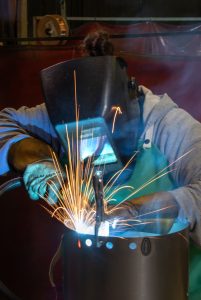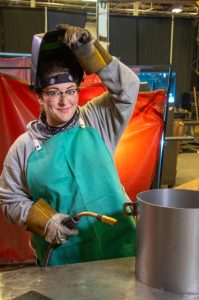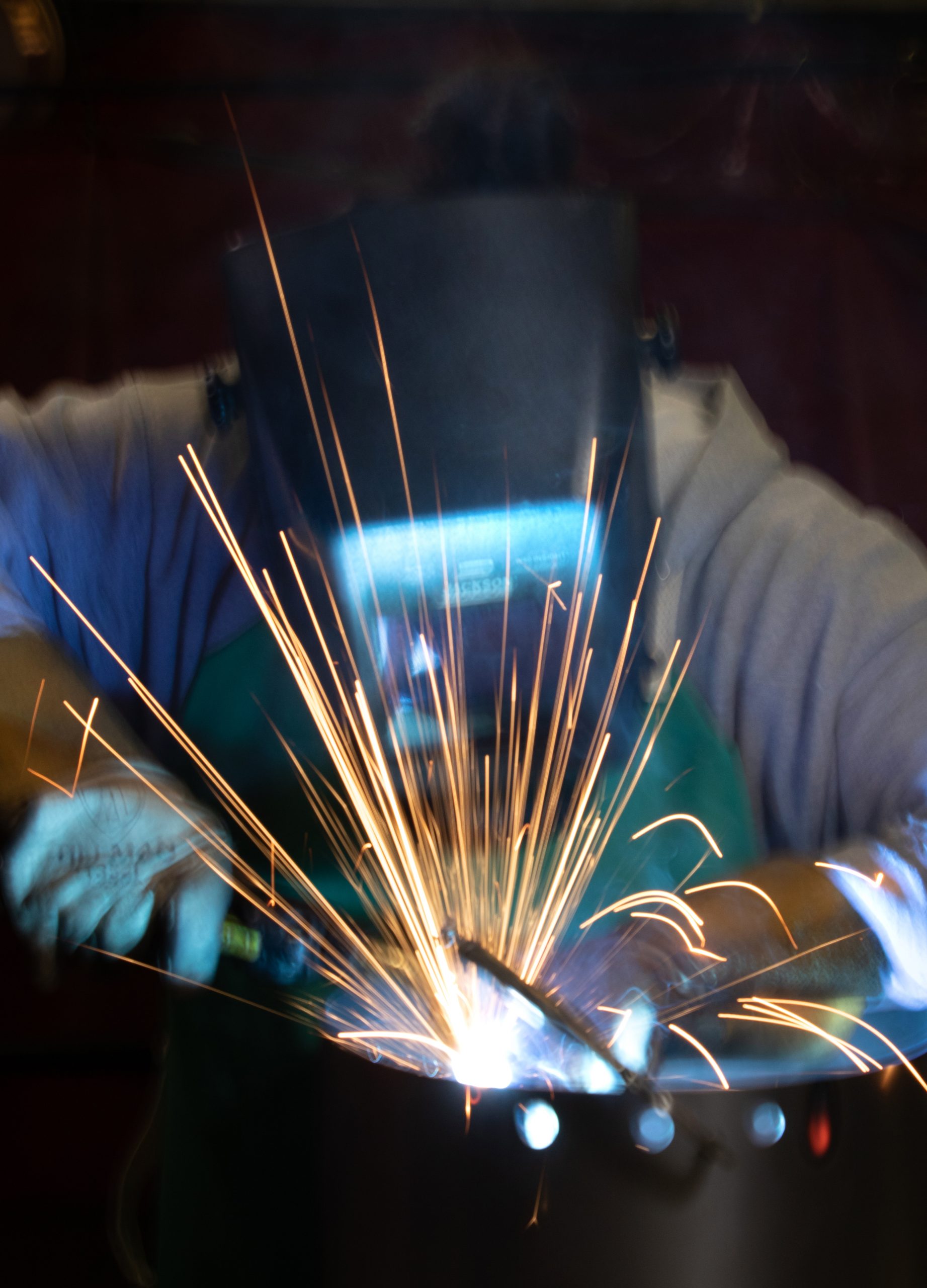In high school, Armstrong Alcius had big dreams. He wanted to pursue a career in industry, help support his mother and siblings, and obtain his U.S. citizenship. Now, at age 19, and with a little help, he’s accomplished all three.
Alcius, who moved with his family to Connecticut from Haiti at the age of 10, attended high school at Norwich Free Academy. “I wanted to be an engineer, and I was taking an engineering class,” he recalls.
Then fate stepped in to jumpstart his plans. “In my senior year, I heard there was going to be a big presentation [at school] about the Electric Boat manufacturing pipeline program.” Essentially, the program would offer five weeks of free training that would almost certainly lead to a full-time job with a local manufacturer, and possibly with Groton-based submarine producer General Dynamics Electric Boat.
“It sounded interesting,” says Alcius. “Before that, I was thinking of going to Three Rivers Community College after graduating from high school and taking engineering. But I thought, ‘This is a great opportunity.’ I just took the chance.”
The goal of the manufacturing pipeline initiative (MPI), developed and run by the Eastern Connecticut Workforce Investment Board (EWIB) and its partners, is to help local manufacturers find skilled workers, and to provide lucrative career opportunities for students willing to undergo the customized training they need to be successful.

In July, after earning his high school diploma and passing the math test required to get into the MPI program, Alcius began attending classes at the Three Rivers campus in Norwich. “I liked the training,” he says, explaining that it offers hands-on learning in a variety of skills – carpentry, blueprint reading, welding, machining, and more.
“In the shops, we got to have experience in different trades to see how we liked them. My favorite was the blueprint reading, the layouts, and precise measuring. They have mentors and other people there from Electric Boat who would let us problem-solve on our own, and then you could ask them for help if you couldn’t [find the solution].”
In August, Alcius graduated for a second time.
Almost immediately afterwards, the Taftville resident landed a job as a full-time apprentice with AMGRAPH Packaging in Baltic, just 10 minutes from home. His duties include inspecting rolls of packing, operating hoists, and more. He’s a member of the union, earns $18 per hour, and has plenty of opportunities for advancement. “Right now, I’m learning the assistant operator position. I’ve done it a couple of times when the other guys went on vacation,” he says.
He can’t say enough about MPI. “It’s a great program. After I completed it, I recommended it to all of my friends. Two of them finished the class a few weeks ago.”
Best of all, unlike college or university training, the program allows students to obtain their training without going into debt. “No student loan,” Alcius says. “That’s what caught my eye from the start.”
The program’s organizers are very invested in the students’ success, and make sure they know that assistance is available if they run into any hurdles while attending classes. “They have a budget we can access if we need it, and they help with transportation if we have problems getting to class,” Alcius explains.
He also received a more personal kind of help. “Before the program started, I didn’t have my U.S. citizenship. They gave me the money to pay the application fee.” In August, he got the call that his application had been approved, and soon after, he and his family proudly attended his citizenship ceremony.
Alcius has an 11-year-old brother, a 9-year-old sister, and an 18-year-old sister who is handicapped. His father isn’t really in the picture, he says, so Alcius feels a responsibility to assist the family financially. “That’s what’s motivating me the most. They look up to me to help them out. I buy them what they need – not everything they want. I don’t spoil them,” he explains. “I feel like the program helps me support my family instead of going straight to college and getting into debt.”
Future plans do include college, he says, but right now, he’s just feeling grateful for the amazing opportunity presented to him. “I want to save up and pay for my college myself. I’m looking forward to going Three Rivers and taking engineering, mechanical, and business classes. I want to invest in my career.”
Too many jobs, not enough workers
Connecticut has long faced a shortage of qualified workers to fill positions in the state’s manufacturing industry. Four years ago, having realized that this situation would not improve without a targeted effort to address it, the EWIB applied for and received a three-year, $6 million U.S. Department of Labor grant to identify unemployed and underemployed job candidates, and offer them specialized training for positions with manufacturers in the region. In return, the EWIB, led by president John Beauregard, promised to fill 400 jobs.
The board worked closely with educational institutions and area manufacturing firms to determine the exact type of training needed and then offer it at no cost to students. The results have exceeded all expectations. Since MPI began, more than 1,300 participants have been trained at local schools and colleges, and placed in jobs. Roughly 200 manufacturers, both large and small, have been hiring through the program.
“That was the intent here – to make sure that not only large employers but smaller and medium employers had a place to turn to for the development of tomorrow’s manufacturing workforce,” Beauregard says.

Since the program started, eastern Connecticut has seen ongoing economic growth, much of it attributed to an expansion in advanced manufacturing and eastern Connecticut’s “unique ability to find the workforce talent for that sector,” says economist Don Klepper-Smith. “The MPI program has provided a clear and dramatic boost to the economy.” He says in addition to putting more money in people’s pockets, the jobs pipeline has prompted more people to buy homes.
Meanwhile, applicants are streaming into the program, lured by the prospect of a lucrative and interesting career. Because the training curriculum and standards are determined by employers, students’ chances of being hired once they graduate are high, even though almost 80 percent have had no previous manufacturing experience.
With millions in additional funding provided by the state and private sources, the original timeline for the program has been extended. Over the next few years, Beauregard says, Electric Boat plans to spend more than $800 million on construction projects related to the development of its new Columbia class submarine. “So, obviously, there will be a great need for construction workers.”
He would like to see this successful model used elsewhere – and in fact, that’s already happening. The board shared its approach with its sister workforce development board in New Haven, which started similar classes of its own. The EWIB also contacted the New England Board of Higher Education to discuss implementing the program throughout New England. Meanwhile, other organizations across the state have launched their own manufacturing pipeline initiatives.
In February, Mark Ojakian, president of the Connecticut State Colleges & Universities (CSCU) system, announced its “TEAM Works” advanced manufacturing strategic plan, designed to train 35,000 students to fill jobs in the sector over the next 20 years.
Ojakian said while CSCU’s 17 post-secondary schools make up the largest higher education network in Connecticut, its community college-based advanced manufacturing technology centers don’t have the capacity to produce all of the highly skilled graduates that will be needed by the growing high-tech manufacturing industry.
The plan calls for the close collaboration of “stakeholders across education, government, and industry, including CSCU’s colleges and universities, Connecticut’s comprehensive and technical high schools, Goodwin and other private colleges, the state’s regional workforce development boards, and advanced manufacturers and business organizations, among others.” Multiple partners have already signed on, and the momentum is growing.
Meanwhile, Eric Brown, vice president of manufacturing policy and outreach for the Connecticut Business & Industry Association (CBIA), has been working with his team over the past year to create new initiatives aimed at shifting the already vigorous manufacturing sector into an even higher gear. For instance, a new Connecticut Manufacturers’ Collaborative has been formed to help manufacturers work together to drive positive change.
Brown says the state’s companies are in “a time of transition. It’s a challenge for manufacturers to gain awareness of technologies that might be helpful for them, and to keep up – not just in the state but globally – with the technology associated with manufacturing advancements.”
And he warned that the pace of change isn’t going to change any time soon, except to speed up. “Manufacturing 4.0 – that’s coming. Our manufacturers tell us that over the next five years, the advancements are going to be rather dramatic. The industry is going to need higher skilled workers to not only use these technologies but to create them, to build them, to service them. It’s going to be a continual upward trend.”
Raising the bar
It’s important to know that manufacturing pipeline programs are not restricted to young people seeking a career. They also welcome older folks looking to change direction or re-enter the workforce. Theresa Grills is a case in point.
Grills, 37, had been working in restaurants and bars as a bartender for 25 years. After going through a divorce, the mother of two began reassessing her options. “As a bartender, there’s a cap on how much you can make,” she says.
As she worked to provide for herself and her children last year, the Waterford resident began to hear about opportunities in manufacturing. “I knew that the money is really great and that it doesn’t require a lot of schooling, and a light bulb kind of went on. I thought, ‘Maybe I’ve been doing the wrong thing.’”
But before she could put any plan into motion, things took a turn for the worse. Grills learned her existing company was going under. She lost her job. Money grew tight as she hunted for another one. A tree fell on her house. She found the manufacturing pipeline website online and applied to get into a welding class but wasn’t accepted. Nothing was going right.
Finally, she found a new job in downtown New London. Then one of the students in the welding class left and Grills got a call from the manufacturing pipeline program, saying, ‘If you want it, you have to start now.’ She phoned her new employer and said she couldn’t take the job.
The next thing she knew, she was taking welding classes five nights a week. She graduated at the end of March and began looking for work. After being “brushed off” by several employers who were only willing to hire an experienced welder – and receiving a few job offers at $12 an hour – she went back to bartending for a while. Then, in early May, she got her big break.

Today, Grills works full time as a welder at Sound Manufacturing in Old Saybrook. “They’re a great company,” she says. “They give me flexibility, and I get paid holidays and benefits, which is something I never had before.” She works the first shift, Monday to Friday, in an all-female manufacturing unit.
And how does she like her new welding career? “I found that I love it. In the beginning, I was really out of my comfort zone. I’d never even held a tape measure before. But it’s a weird mix of art and science, and you have to have an eye for detail and a steady hand,” she says. “Now I go to work and build things; it’s pretty cool. I work with a lot of really great people.” She also already knew one of her coworkers – a female student from her welding class.
Now she’s trying to give back, guiding other people through the online application process for the jobs pipeline program, which she says isn’t always intuitive. “I’ve helped a number of people apply. It’s such a great program. I was able to complete schooling in three months for a trade, with no debt racked up from it. It was pure benefit to me.”
She says her kids are intrigued with their mom’s new job. “They think my tools are neat. My daughter, who’s seven, calls it my ‘dirty work.’ With my son, who’s 11, we watch welding videos together. He loves it.”
Grills says she has endless appreciation for the people who opened the door to her new life.
“I can’t say enough good things about the Montville training center, and the people who work there are wonderful. I’m four or five months out of training and they still call to check in with me, and make sure that I’m OK. They’re really always out there, willing to help people. I hope more people find out about this program.”
Shopping for opportunity
Jason Dodge is glad he did.
After dropping out of college, Dodge spent almost 20 years working in retail or warehouses. “I wanted to work instead of going to school,” he explains. But he recently began to have doubts about his career path as the major retailer that employed him continued to downsize. “There was downward wage pressure, and I was told that there was nowhere for me to move. In the interest of job security, I decided that once my children were old enough that I could be away during the day, I would look for something else. I started out looking for welding jobs, even though it was not something I was particularly interested in; it was a skill that was in demand.”
Then one day, a friend shared a Facebook post about someone else in a welding program. “He said the training was great and if you do well, you can make really good money. I found the pipeline website and contacted them,” he recalls.
He visited one of the program’s testing centers and “I did really well on the test, but then I met with a case worker who said, ‘They’re not holding the welding class for eight or nine months. But you can take machining and CNC.’ That was something I’d always been interested in anyway.”
Dodge, who was still working the graveyard shift at his retail job, had to show up for his new training at 7 a.m. – right after work – a couple of times. “It wasn’t easy, but it was definitely worth it,” he says. “I started the intro program in mid-June for seven weeks at Quinebaug Valley Community College (QVCC) in Danielson. I live in Lebanon, so it was a 45- to 50-minute drive each way. Training was six hours a day for seven weeks, just like going to college. It was way more than I expected. But I was hoping to get a foot in the door somewhere.”
A
nd that’s exactly what happened. “A cornerstone of the QVCC program is that they have strong connections to local industry,” Dodge explains. “Most of instructors were machinists for many years. They get you paid internships. I did well in the course and one of the instructors recommended me and I was hired from the intro program. That’s pretty rare. A company hired me sight unseen and then paid for my tuition to go to a 32-week machinist course, also at QVCC.”
Today, Dodge still works at Micro Precision LLC in South Windham, which hired him under Connecticut’s apprenticeship program. “When I graduated, there was a need for people for the quality control program, so I’m not machining at all. That’s a nice thing about the industry – there are a lot of different directions that you can take, and you can specialize in things that have a lot of opportunity.”
He really enjoys working for a smaller company and the flexibility it allows. “If my kid’s bus is late in the morning, it’s not a big deal. They’re very people centered. I’ve been thrilled with the new job. It’s nice to have room to grow, finally.”
He sees himself staying put for a long time. “If I could retire from Micro Precision in 23 years, that would be ideal for me. I’m 20 minutes from home so I can be home with my kids [12, 9, and 7] after school. It’s such a different life from what I had before. If I could stay there forever, that would be awesome.”
That is not to say that the work is easy. “Everything about it is challenging. I was shocked by just how smart those guys who wear T-shirts and boots are.
I’ve been really lucky because in quality control is a gentleman who has been here for quite a few years; he makes really difficult things seem really easy and he’s there with me all day, willing to explain things and taking the time to do that,” Dodge says. “I’m definitely not comfortable. They say if you feel comfortable, you must not be growing, so I must be growing. At my other job, I was bored. I’m definitely not bored now.”
He would highly recommend manufacturing pipeline programs to anyone interested in giving it a shot.
“Connecticut is second largest manufacturing economy in the country. Machine shops in eastern Connecticut are world renowned,” he says. “We’re dying to hire people. We’d love to hire three more people right now, if you’re willing to show up to work and learn. The jobs are out there if people want them.”
He wishes a lot more employers – and potential employees – would take advantage of the state apprenticeship program that opened the door to his new career. “They subsidized my education. Now, they offset educational expenses for employers and subsidize my wage. That takes a lot of the risk out of it for the employer. And I have a state journeyman credential that I can take with me anywhere.”
At age 43, he says, “it was kind of weird going to school. But it just proves that it’s never too late to start something different if you’re not happy with what you’re doing. You literally spend a quarter of your life at work. Life is short. You can’t afford to be miserable.
For more information about EWIB’s manufacturing pipeline initiative, or to apply, visit ewib.org/pipeline.
Carol Latter is the editor of Seasons Magazines.







More Stories
Foraging Around the Nutmeg State
Moving Up: Florida to Connecticut for Seasons, Schools and Safety
Listen Here! The Declining Art of Listening